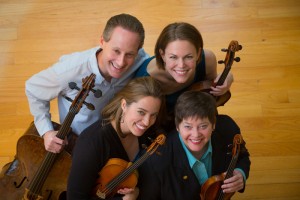
The Serafin String Quartet: Lawrence Stomberg, Esme Allen-Creighton, Kate Ransom, and Lisa Vaupel (Clockwise from top)
We caught up to them after they had just finished a class for a high school string ensemble and were preparing to rehearse works by Beethoven, Borodin, and Still.
The quartet is named after Kate Ransom’s violin, made by the Italian luthier Sanctus Serafin in 1728. Lawrence Stomberg, ‘cello; Lisa Vaupel, violin; and Esme Allen-Creighton, viola, all play Testore instruments from the same era, thanks to generous support from Dr. William Stegeman. The instruments blend together so well. But, as you’ll hear in the interview, the musicians themselves mesh and blend together into a very strong quartet.
We talked about the pieces they are going to play in a concert in the Arts at Trinity series on Oct. 25, next year’s trip to play at Carnegie Hall, other music they will be playing in the coming year, their teaching, their instruments, folk themes in classical music, and many other topics.
If you missed this charming interview when it aired on WVUD, make sure you use the link below to listen. Then visit the Serafin Quartet’s website for more information about their upcoming performances and their recordings.
The Interview

Serafin String Quartet
Recorded 10/8/15; Initial airdate 10/13/15; host: Mandorichard
29:45
28.6 MB
The music
| Artist | Work | Album | Label | Year |
| Serafin String Quartet | William Grant Still: Danzas de Panama for String Quartet: Tamborito (1st movement) | Serafin String Quartet | Centaur | 2010 |
| Serafin String Quartet | William Grant Still: Danzas de Panama for String Quartet: Cumbia y Congo (4th movement) | Serafin String Quartet | Centaur | 2010 |

